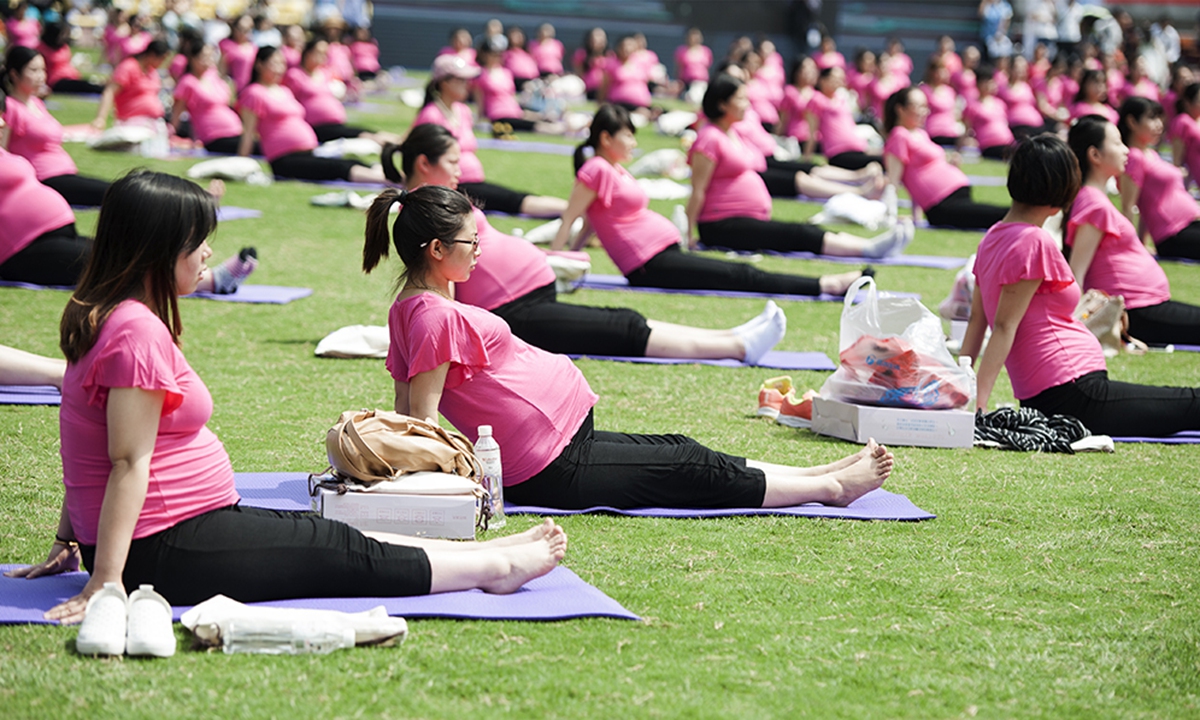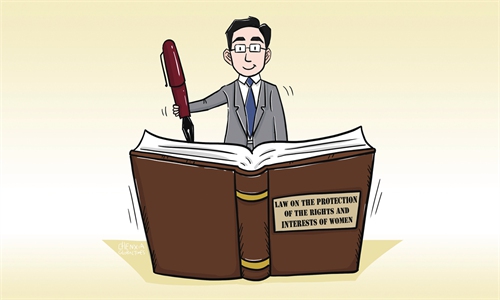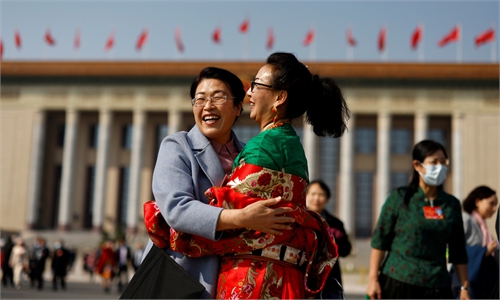
Nearly 1,000 pregnant women practice yoga together at the Hefei Olympic Sports Center. Photo: VCG
Chinese women's rights and interests will be better protected as a law revision was passed by China's top legislature on Sunday, specifying measures to promote gender equality and ensure that women enjoy equal rights with men in the political, economic, cultural, social and other fields.
The revision to the Law on the Protection of Rights and Interests of Women was passed by the Standing Committee of the 13th National People's Congress (NPC) during its 37th session on Sunday, and it will come into effect on January 1, 2023.
The newly revised law gives more prominence to women's characteristics, emphasizing the protection of their special rights and interests and taking into account women's special needs.
It provides special protection in medical care, health examinations, public facilities, and maternity services, prevention of sexual harassment and elimination of gender discrimination in employment.
Emphasizing that women's human dignity is inviolable is one of the highlights of the revision. It prohibits fetal sex identification for non-medical reasons and artificial pregnancy termination due to sex selection.
It also stipulates that medical institutions should respect the wishes of women when carrying out medical procedures, which have often been determined by their spouses.
"Ensuring female fetus' life rights is an important embodiment of the fundamental national policy of gender equality," Lü Xiaoquan, a senior lawyer at a Beijing law firm, told the Global Times on Sunday. "So does the practice of giving women the final say on operations such as giving birth, as long as they are conscious and have the capacity."
If they are in a coma and can't make decisions for themselves, Lü suggested that medical institutions should be given the right to conduct treatment in case of an emergency, even if their spouses didn't sign an informed consent form.
Another significant change in the law is that it mandates that government departments at all levels must report, rescue and take care of women who were abducted, trafficked or kidnapped.
"The obligation for government institutions to report such issues is essential in two ways. First, abducted women could be rescued when they don't have the ability to ask for help. In most cases of abduction and trafficking, women completely lose their freedom and are closely watched all the time. Women also usually don't have the financial resources to escape," said Lü.
In addition, if abducted women marry and have children with their buyers, many of them would not think of escaping and leaving their families, so they won't report they were trafficked even if they have the chance to do so. To combat the crime of abduction in such cases, the mandatory reporting system can work well to find and punish human traffickers and buyers, the expert said.
In terms of improving labor and social security rights for female workers, the law specifies that gender discrimination in employment should be eliminated, and the definition of such conduct be clarified. In addition, gender discrimination at work will be included in labor security supervision.
An employer is obliged to ensure the maternity rights of female employees. The law requires that employers must not restrict the promotion of female employees due to marriage, pregnancy, maternity leave or breast-feeding.
"China's labor law clearly stipulates that job candidates can refuse to answer questions irrelevant to work, but the problem is that gender discrimination may still exist but become more implicit," Lü told the Global Times. "Some employers may decide not to recruit or promote females by finding other excuses without directly showing their discrimination. We need clear rules and practical measures to recognize this implicit gender discrimination and impose heavy punishment on companies that conduct it."
The law improves the mechanism for preventing and handling sexual harassment. It also aims to strengthen the protection of women's rights in marriage and relationships by expanding the scope of application of personal safety protection orders.
The revision of the law is an expression of respect for and protection of human rights, said Guo Linmao, an official with the Legislative Affairs Commission of the NPC Standing Committee, China Women's News reported on Sunday. It is also a strong support for promoting women's comprehensive development and a practical response to social concerns.
The Law on the Protection of Rights and Interests of Women was adopted in 1992, which created a good international environment for the successful convening of the Fourth World Conference on Women in Beijing in 1995 and the significant achievements it made. The Standing Committee of the NPC made major amendments to the law in 2005 and further adjustments in 2018.
Recently, a number of crimes against women were reported in China that shocked the public and drew huge attention to the protection of women's rights. In June, a brutal assault occurred late at night at a barbecue restaurant, when several men harassed and beat four women, causing injuries.
In February, a mother of eight children was found chained in a hut in the freezing winter in East China's Jiangsu Province. She was later identified by the police as a trafficked person.
Zhu Haoning contributed to the story


